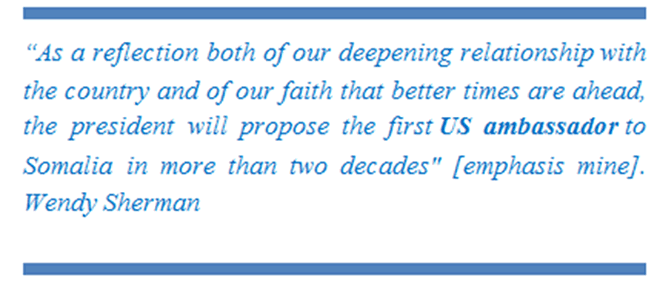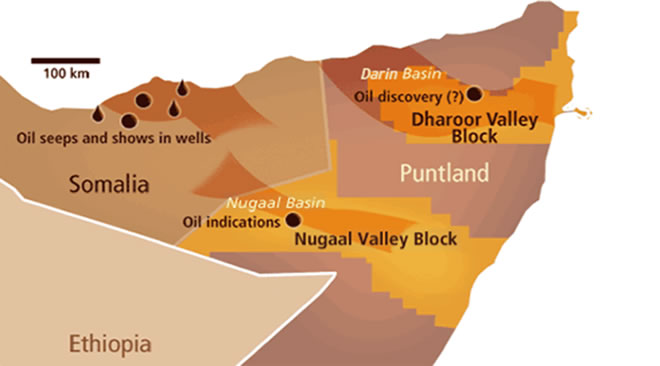A Commentary by Mohamed Elmi
Thursday, June 5, 2014
A shift in paradigm thinking is happening in Washington. Somalia needs a more integrated policy approach that incorporates the diverse needs and aspirations of all Somalis. This is the only path to genuine and lasting peace in Somalia. An alliance with interregional powers and a few Somali intraregional networks or agencies to coordinate humanitarian and counterterrorism efforts have proved woefully inadequate. The new U.S. policy might be a radical departure from old structures and old practices; at least given the reactions of the large Somali communities living in Somalia and the United States, the new policy was hailed by many with great enthusiasm and hope for a peaceful and prosperous Somalia.
On June 3, Wendy Sherman, the Under Secretary of State for Political Affairs, presented her country’s shift of foreign policy in Somalia away from the mere binary of terrorism-counterterrorism strategy. Wendy Sherman reiterated that seven out of the 10 fastest growing economies in the world are in Africa.

Somalia was, therefore, increasingly disadvantaged in the current global and African economy. While a seismic shift, I believe the new U.S. policy is pivoted on both regional stability and recent commercial development trends in the region. According to the Wall Street Journal, several “risky-happy” small oil companies (Norway’s DNO, and the Turkish Genel Energy) have signed agreements with “Somaliland” officials to explore oil- and gas-prone blocks in Nugal (Sool) and Al Medo/Darin (Bari and Sanaag) regions of Somalia. The United Nations' Monitoring Group for Somalia and Eritrea reported "poor transparency" on the financial disclosure of those deals. "Somaliland" authorities raided the headquarters of Haatuf and its twin online newspaper Somaliland Times in Hargeisa after giving an in-depth coverage on an alleged case of bribery concerning the signing of bonuses. Genel Energy, a Turkish oil firm, also offered to finance a new oil protection force unit. However, the blocks were under exploration license to Western MNCs such as Royal Dutch Shell and ConocoPhilips prior to Somalia’s disintegration, a date that coincides with the closure of the U.S. Embassy in 1991.

Source: Range Resources
Change in Policy
Is the new U.S. policy driven by a moral challenge to tackle poverty and conflict and to help Somalis reconstitute its statehood as articulated by Sherman? Or is it both a moral challenge and commercial interest for the Obama administration? It appears that the new U.S. Policy in Somalia quite veers from its old dual track policy, which I believe had recognized the need to work with both the central government and established and emerging regional administrations such as Puntland, Somaliland under the framework of federalism. That policy was also aimed at converging competing interests and promoting stability in the Horn of Africa region. As articulated in 2010 by Ambassador Johnnie Carson, Assistant Secretary of State, Bureau of African Affairs, the dual track policy was designed to help local level administrations build sustainable capacity and sound economic development. To my understanding , that policy also helped create the special American trained elite forces in Puntland, Somaliland, and now the Federal Government (Alpha Group). On the economic side, USAID took a more prominent role of humanitarian and development programs along with private agencies that usually win most of its contracts, DAI, Inc., Oxfam, etc.
As a concerned Somali American, I wish to see peace and dignity restored. The prognosis is for Somali leaders to compromise. The United States is ready to assist Somalia stand on its feet once again. Two major things bolster my conviction that America will stay true to its promises for Somalia guided, of course, by its geopolitical interest. The Obama Administration announced its plan to nominate the first ambassador to Somalia since the inception of the civil war. The United States also reaffirmed its pledge to assist the internationally recognized Somali Federal Government (SFG) and sub-regional governments on good governance and sound economic development. The United States respects the territorial integrity and sovereignty of Somalia.
Somalia is geographically perched on a strategic position of the global map; it’s a country, though endowed with untapped natural resources, haunted by a history ofinternacine clan warfare on one side and fierce resistance to foreign invasions, resulting in prolonged anarchy and sectarian conflict that still continues to this day. A country carved up into competing autonomous units with overlapping but illegal clan borders! Some clan elites have utilized quite effectively secession as a bargaining chip for the rights of their constituents. Other clan elites likewise have pursued a similar strategy for power-sharing with the government in Mogadishu or favorable political settlement. Still many other clan groupings wish to carve up their own regional administrations on the basis that the Constitution is still an evolving provisional document. It's expected that the provisional constitution will be finalized to recognize and incorporate state constitutions and to preempt or repeal challenging articles thereof. The Constitution will be approved in a referendum following the formation of five independent commissions.
The war-wearied Somalis today stand ready to seize the moment and to lay the foundation for what other developed nations have achieved: an inclusive, accountable, responsive and self-sufficient government headed by elected national leaders. The U.S. policy in Somalia carries significant weight but it's no less different than any other policy--that is an authoritative or executive order to effect an outcome--that will possibly yield long-term mutual benefits between the two friendly states. Policies often have unintended consequences. The ultimate choice resides with the Somalis as to whether they will reconcile their primordial differences and compromise for the sake of posterity in restoring their nation-state or stay a divided and isolated nation. Time is of the essence!
References
Scheck, Justin. (2014, May 30). U.N. Monitors Concerned over Somaliland’s Plan for Oil Security Force. The Wall Street Journal. Retrieved from http://online.wsj.com/articles/un-monitors-concerned-over-somalilands-plans-for-oil-security-force-1401471420
Sherman, Wendy. (2014, June 3). U.S. Foreign Policy in Somalia [Video file]. Retrieved from https://www.youtube.com/watch?v=aFmVbKKJn7g